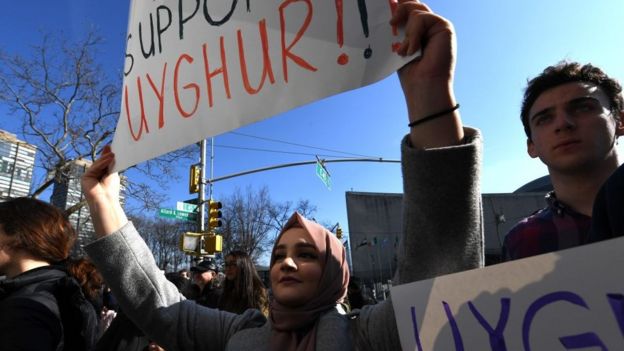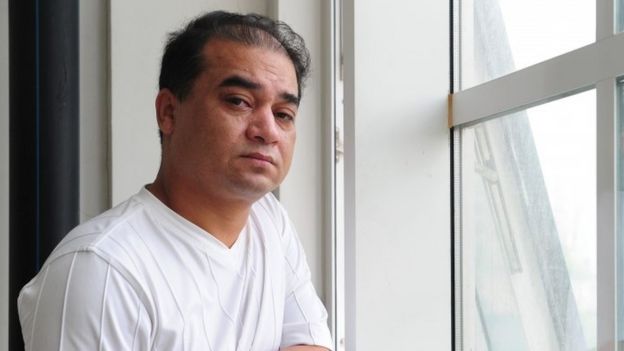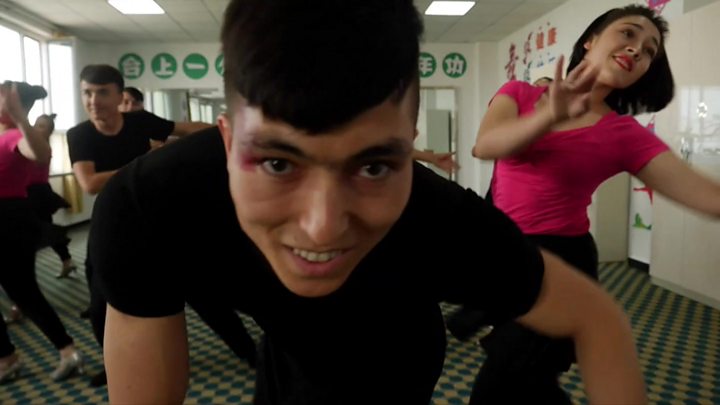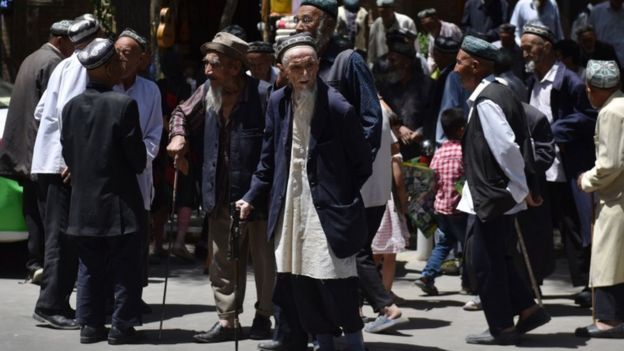An academic jailed for separatism in China has been awarded the European Parliament’s top human rights prize.
Ilham Tohti, who is from the Uighur minority, has been a fierce critic of China’s treatment of the Uighur people. He was jailed for life in 2014.
More than a million Uighurs and other ethnic minorities are reported to have been held in camps in China’s restive Xinjiang region.
Mr Tohti, seen by many as a moderate voice, has denied being a separatist.
Although still in jail, Mr Tohti, 49, has been recognised for drawing attention to ethnic tensions in Xinjiang. A ceremony awarding him the Sakharov Prize in his absence will be held in Strasbourg in December.
- The Uighur geography teacher who vanished in China
- The vanished Uighurs of Xinjiang
- China’s Muslim ‘crackdown’ explained
China had accused him of separatism and stoking ethnic tensions. The economics scholar’s imprisonment provoked condemnation from human rights groups, with the UN, the EU and US calling for his release.
The EU Parliament said Mr Tohti deserved the Sakharov Prize for his attempts to “foster dialogue” between Chinese people and the Uighur. “The parliament calls on the Chinese authorities to release him immediately,” EU Parliament President David Sassoli said.
The Sakharov Prize for free speech is awarded by the EU Parliament annually in memory of Soviet physicist and dissident Andrei Sakharov.

Other nominees for the 2019 prize included Russian opposition politician Alexei Navalny, prominent Brazilian gay rights activist Jean Wyllys and the Restorers, a group of student app developers from Kenya.
Previous winners have included Pakistani schoolgirl and campaigner Malala Yousafzai (2013), Cuban dissident Guillermo Farinas (2010) and two Yazidi women who escaped Islamic State (2016).
Who is Ilham Tohti?
Born in the city of Artush in Xinjiang, Mr Tohti is an economics scholar known for his research on relations between the Uyghur and Chinese Han.
While teaching at Beijing university in 2014, Mr Tohti was detained after criticising Beijing’s response to a suicide car attack near Tiananmen Square carried out by Uighurs.

Prosecutors at the trial alleged he was engaging in separatist activities, including promoting independence for Xinjiang on his website, Uighur Online.
At the time, Human Rights Watch said Mr Tohti had “consistently, courageously and unambiguously advocated peacefully for greater understanding and dialogue between various communities, and with the state”.
Earlier this month, Tohti received the Council of Europe’s Vaclav Havel Human Rights Prize. He was awarded the prize for “giving the entire Uighur people a voice”.
What’s the latest in Xinjiang?

Xinjiang, which borders Central Asia, has seen rising tensions between Uighurs and Han Chinese migrants in recent years. The Uighurs are a Turkic-speaking Muslim minority.
Fearful of separatist violence in the region, China has been carrying out a massive security operation. Human rights groups and the UN say China has rounded up and detained more than a million Uighurs and other ethnic minorities in vast detention camps.
China says they are attending “vocational training centres” which are giving them jobs and helping them integrate into Chinese society, in the name of preventing terrorism.
In July more than 20 countries at the UN Human Rights Council signed a joint letter criticising China’s treatment of the Uighurs and other Muslims.
Uighurs and Xinjiang

- Uighurs are ethnically Turkic Muslims
- They make up about 45% of the region’s population; 40% are Han Chinese
- China re-established control in 1949 after crushing short-lived state of East Turkestan
- Since then, there has been large-scale immigration of Han Chinese
- Uighurs fear erosion of traditional culture




 Print
Print Email
Email